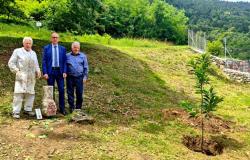Heat waves occur when very high temperatures are recorded for several consecutive days, often associated with high levels of humidity. What are the risks to our health, how to avoid them and what are the services in the area?
“It is very important – says Dr. Franco Romagnoni, director of the Primary Care Department of the Local Health Authority of Ferrara – to talk about the consequences of the heat waves that have hit us in recent days. This is not just a banal inconvenience but these aspects have a significant impact on physical health. With the increase in temperatures, the risk is not only that there is a small collapse or an anomaly in some blood chemistry values, but it has been shown that there can also be an overall increase in the mortality rate of the population”.
“The Lancet Countdown, an international research collaboration that monitors the evolution of the impacts of climate change on health, in its 2023 report – it continues – highlighted an alarming trend that could even worsen the impact on health in the coming years. According to data from this study group, deaths attributable to heat waves in 2022 would have been around 70,000 in summer 2022 alone. Europe is the fastest warming continent in the world, with warming double the global average starting from the 80s. According to these estimates, Italy is the EU country in which the impact on mortality has been heaviest.”
“Above all, the most vulnerable people will pay the price. There are some effects that are determined by temperature and therefore by heat; others that can be caused by incorrect exposure to the sun. Both things are harmful. Among the main risks of excessive heat are not only dehydration, but sunstroke, cramps, edema, congestion, effects on blood pressure, heat stress, heatstroke, worsening of illnesses pre-existing conditions and fever” adds Romagnoni.
“The Ministry of Health has brought together a series of advice – explained Romagnoni – in a decalogue to deal with the great heat without risks to health”.
Some of these tips are: only leave the house during the cooler hours of the day; wear appropriate and light clothing (it is not wrong to use an umbrella and long, covering clothes); refresh the home (limiting the use of ovens and stoves) and work environments, but being very careful about how air conditioners are used. The decalogue also invites you to look for solutions to reduce body temperature, not to overdo physical activity, drink regularly (at least 2 liters of water a day) and eat correctly, take some precautions if you go out by car, keep medications correctly, take special precautions if you are at risk and supervise and take care of fragile people.
“We are accustomed – continues Dr. Romagnoni – to this type of waves and climate and there are dedicated projects and services, especially for the most fragile people and the elderly. The person who knows they are most at risk must, in this period, pay particular attention to self-care. For example, consulting your doctor to reevaluate your therapy, due to the extreme heat condition. There are also a series of services throughout the province that people can turn to for information and advice. These services also monitor people at risk, so as not to leave them alone.”
The “Uffa che Afa” project, the free service of the Municipality of Ferrara to combat the widespread discomfort caused by the heat, suffered especially by the frail categories and the elderly, is operational until September 15th.
The elderly and people in difficulty due to heat waves can call the toll-free toll-free number 800 072 110, active from Monday to Friday from 8.30am to 5.00pm, for information and advice, social assistance and emergency assistance. and on Saturdays from 8.30 to 13.00 (for health problems the number to call remains 118).
The operational group is made up of the Department of Social Policies of the Municipality of Ferrara, Asp, ASL Ferrara, University Hospital of Ferrara, Civil Protection, Lepida. The police forces also participate in the project, together with Coop Integrazione Lavoro and the Pro Loco Casaglia, Auser, Anteas, Red Cross associations which form the partnership that was created as part of the “I’ll take you” service.
In case of need, the SSUI Integrated Social Help Desk of the Municipality of Ferrara also remains available, the first point of access for the complex needs expressed by citizens. Located inside the Cittadella San Rocco in Corso Giovecca 203, to get in touch with the SSUI you can call the numbers 349 3142452 and 342 8951860; or send an email to [email protected].
Other useful numbers and contacts:
– Single toll-free number of the Regional Health Service 800 033 033. For information on local anti-heat initiatives and contact persons, citizens can call the toll-free number (open every weekday from 8.30 to 18.00 and on Saturdays from 8.30 to 13.00).
– “HEAT RISK”: THE DEDICATED WEBSITE (HTTPS://WWW.ARPAE.IT/CALORE). The regional heat wave warning and forecast system also contains useful advice for dealing with hot summer days, health information, historical data relating to bioclimatic discomfort in past years and much other information in the “Find out more” section.
– WWW.SALUTE.GOV.IT website of the Ministry of Health which hosts a specific page on heat waves, information leaflets intended for those who assist elderly people, staff of care facilities, doctors and a series of FAQs and useful information on the risks of heat waves and the measures to be taken.





